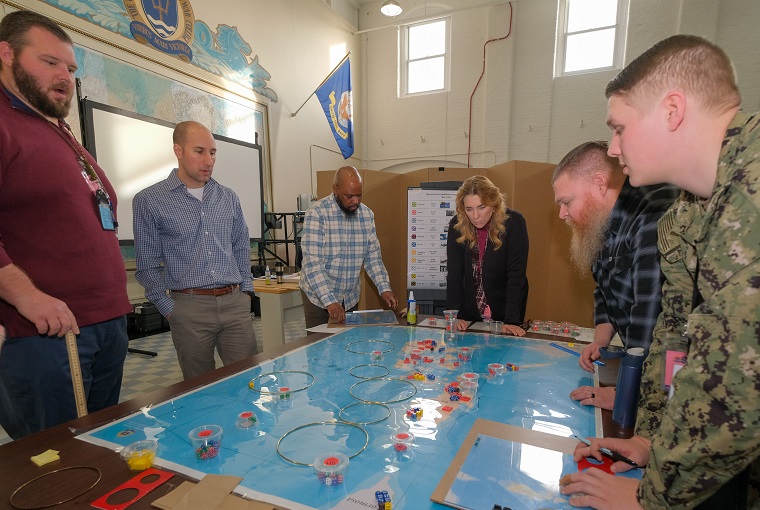U.S. Naval War College's War Gaming Introductory Course: Providing Value Via a Multi-Pronged Approach

Newport, R.I. – The war gaming course attendees’ responsibilities vary on tactical, operational, and strategic levels of war. But all are important to national defense. As such, 45 people - connected by mission - attended the latest iteration of the War Gaming Introductory Course (aka War Gaming 101) held January 17 –26, 2023 at the U.S. Naval War College (NWC). Students consisted of War Gaming Department (WGD) enlisted personnel and military faculty officers, other NWC military faculty, military officers from the Joint Staff J7, and government civilians from the U.S. Air Force, U.S. Space Command, and various U.S. Navy organizations. The represented organizations will be either creators of, contributors to, or consumers of war games.
As a fundamental research area for the Office of the Chief of Naval Operations (OPNAV), war gaming offered by the WGD is an integral part of NWC’s academic programming and provides critical insight into how and why leaders make decisions in maritime and joint warfare. A joint venture between the WGD and Joint Military Operations (JMO) department, and now in its ninth year, War Gaming 101 provides value using a multi-pronged approach that creates knowledge for a diverse group of attendees. Each department uses wargaming for a different purpose: teaching in JMO as opposed to research in WGD. And each department contributes faculty to the course to help illustrate the different applications of war games depending on environment. The course is directed by Shawn Burns, Ed.D., an NWC professor and war game director and Richard Wilbur, assistant course director, NWC war gaming specialist, former surface warfare officer, and retired foreign service officer.
Originally designed to introduce new WGD members, War Gaming 101 has been restructured to accommodate an increase in the breadth of organizations enrolling course participants. Its objective is multi-faceted: outlining the process used to create and analyze war games; exploring the origins, nature, methods, and limits of war gaming; providing essential resources to course participants; and enabling ongoing partnerships that facilitate a larger military objective. Over the eight-day period, presenters offer a series of war gaming classes and practical application activities to help new faculty. They also gain access to more experienced colleagues who serve as mentors over the span of their careers.
“The course is truly a valuable resource,” said Jason Kut, a professor in NWC’s Joint Military Operations department. "We use the same military scenarios encountered in the course as examples to aid student comprehension and illustrate the learning objectives we are trying to establish.”
Kut’s JMO colleague, Professor Chris Kidd, agreed, noting that the JMO department now routinely sends faculty members to the course to help prepare them to use war gaming in the JMO curriculum. “As new faculty come on board, we find the course invaluable to help them understand the value of war gaming in our teaching environment. They also benefit strongly from the mentoring they receive from seasoned JMO faculty who have previously attended the course,” he said.
Combining years of experience in defense and war gaming, and aided by JMO colleagues, course directors deliver a robust curriculum that honors the underlying principles and intent of war gaming: to enable decision-making experience and/or decision-making information through simulated experience. As such, the diverse groups of course participants are provided critical information through lectures and fictitious problems/scenarios that require collaboration to resolve. Each group then critiques and informs the conclusions of the previous group. Thus, the NWC WGD course investigates how people make decisions with imperfect information and why. The course fosters a shared experience that impacts students’ critical thinking, creative thinking, self-reflection, and overall skill set. And its concepts can be adapted to meet the unique needs and resources of each student’s parent organization.
“This is a labor of love to share the knowledge we have with others,” said Burns, a retired Marine helicopter pilot. “There is no charge to participating entities – Army, Navy, Air Force, Marines, and others throughout DoD and other Executive Branch organizations – other than their time.”
Because war gaming is a method also used to create knowledge on decision-related topics of interest to senior military leaders, the WGD designs analytic war games, employing the technique of war gaming as a primary research tool to achieve this end. Thus, as a war game director and researcher, Burns, and his course partner, Wilbur, are also tasked with creating and analyzing games to address real military problems confronting senior leaders who are the sponsors.
“War game participants are experts in their fields. They help create knowledge by sharing their decisions in the context of the artificial environment we create for them. We extract that knowledge and provide value to our war game sponsors via a personalized war game relevant to their needs," Burns commented.
Another area of knowledge creation and value is by way of partnerships. War Gaming 101 facilitates powerful, enduring partnerships among its attendees who are tethered by a common goal of national security. The idea is that, beyond the course experience, they will continue to lean on, and learn from, each other as they operate within their various capacities. For the WGD, these partnerships further assist in refining its existing war games adjudication processes through collaboration with warfare centers (WCs) and warfare development centers (WDCs) throughout the entire Navy to better understand factors influencing engagement outcomes from an engineering and warfighting perspective. Alliances formed with naval entities like the Naval Undersea Warfare Center (NUWC), a key partner in the ongoing adjudication project, are invaluable to the success of the NWC Adjudication Workshop scheduled for April 17 - 21 at NWC.
The next War Gaming Introductory Course is scheduled for August 1 – 10, 2023 at NWC. For more information on the course and registration info, please email the Wargaming Department at Wargaming@usnwc.edu.
